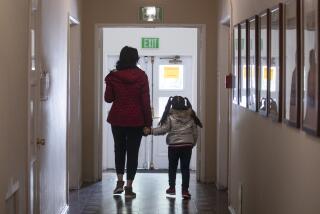A Close-Up Look A People Who Matter : Agency Helps Women Find Safety, Strength
- Share via
When her pager goes off in the middle of the night--as it sometimes does--Clara J. Stroup knows that nothing is guaranteed.
The caller may have just crawled through a window to escape her battering husband, she may be barefoot and only partially clothed.
The woman who dialed the hot line operated by the Assn. to Aid Victims of Domestic Violence may have no idea where to turn next.
“The first issue is always safety,” said Stroup, the the agency’s executive director and only full-time employee.
Stroup and two part-time workers helped 145 victims of domestic violence last year. The agency is the only one of its kind in Santa Clarita.
“We provide support, and offer them their options,” she said.
The agency helps to arrange emergency shelter for battered women in safe houses. But workers are careful not to try to tell victims what to do. After all, the women have escaped a situation where their abusers were trying to control them through violence. Instead, the agency focuses on giving women a chance to rest in safety, collect their thoughts and, eventually, decide what to do.
The agency sometimes helps arrange a restraining order against husbands or boyfriends and may eventually place a woman and, perhaps, her children in a shelter.
Group counseling with other battered women may help the women understand how they have become victims and what they can do to prevent it in the future. Women’s partners, who are often also directed to counseling because of court orders, may be taught how to control their anger and deal with situations without resorting to violence.
But Stroup has never been able to predict how any particular case will end up, if a couple will get back together or if a woman will make a clean break and start life anew.
“I almost always assume that they will go back at least once for a reality check,” Stroup said. “Most of the time, it’s to test whether it really was that bad.”
Barbara Johnson, the agency’s part-time direct service coordinator, also has learned not to make predictions. In her two years with the program, she has been the most surprised at how non-threatening the abusers may seem when she meets them.
“The biggest surprise was to see that they were just guys,” Johnson said. “They could be neighbors or friends. It could be anybody from any walk of life.”
Men who are assigned to group counseling under a court order spend at least 32 weeks in the program. Some may voluntarily choose to stay longer. The time the victims stay in counseling may be longer.
Both men and women learn how to cope with confrontations, set boundaries and take a “time out” when things get too intense, Stroup said.
Women are taught to take practical steps to deal with the cycle of violence if they return to their mates. For example, a victim can often recognize that an explosive confrontation is about to happen. The agency teaches them to work out an escape plan ahead of time, including having a safe place to go, money set aside, gas in their vehicle, birth and marriage certificates and bank account numbers handy.
Holidays may be the most difficult times for abusers and their victims, Stroup said. Many finally come to the agency for help in mid-January.
But this year, the Northridge earthquake upset that pattern as families were forced to work together to survive the disaster. The numbers of women who come to the agency have been down for the beginning of this year, she said.
One in an occasional series featuring winners of the 1994 Los Angeles Times Valley Edition Community Partnership Awards. Personal Best is a weekly profile of an ordinary person who does extraordinary things. Please address prospective candidates to Personal Best, Los Angeles Times, 20000 Prairie St., Chatsworth, 91311. Or fax them to (818-772-3338).
More to Read
Sign up for Essential California
The most important California stories and recommendations in your inbox every morning.
You may occasionally receive promotional content from the Los Angeles Times.










